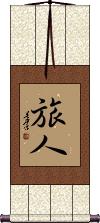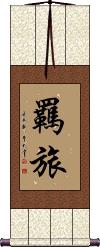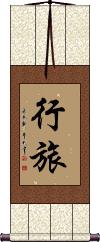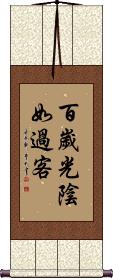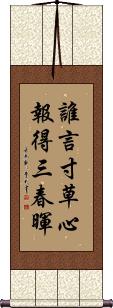Many custom options...
And formats...

Traveler in Chinese / Japanese...
Buy a Traveler calligraphy wall scroll here!
Personalize your custom “Traveler” project by clicking the button next to your favorite “Traveler” title below...
1. Traveler
3. Traveler / Wanderer / Vagabond / Rolling Stone
Traveler
Traveler / To Live Abroad
Traveler / Wanderer / Vagabond / Rolling Stone
Life is Short
A 100-year-old is but a traveler passing through this life
Appreciation and Love for Your Parents
誰言寸草心報得三春暉 is the last line of a famous poem. It is perceived as a tribute or ode to your parents or mother from a child or children that have left home.
The poem was written by Meng Jiao during the Tang Dynasty (about 1200 years ago). The Chinese title is “You Zi Yin” which means “The Traveler's Recite.”
The last line as shown here speaks of the generous and warm spring sunlight which gives the grass far beyond what the little grass can could ever give back (except perhaps by showing its lovely green leaves and flourishing). The metaphor is that the sun is your mother or parents, and you are the grass. Your parents raise you and give you all the love and care you need to prepare you for the world. A debt that you can never repay, nor is repayment expected.
The first part of the poem (not written in the characters to the left) suggests that the thread in a loving mother's hands is the shirt of her traveling offspring. Vigorously sewing while wishing them to come back sooner than they left.
...This part is really hard to translate into English that makes any sense but maybe you get the idea. We are talking about a poem that is so old that many Chinese people would have trouble reading it (as if it was the King James Version of Chinese).
Mountain Travels Poem by Dumu
This poem was written almost 1200 years ago during the Tang dynasty.
It depicts traveling up a place known as Cold Mountain, where some hearty people have built their homes. The traveler is overwhelmed by the beauty of the turning leaves of the maple forest that surrounds him just as night overtakes the day, and darkness prevails. His heart implores him to stop, and take in all of the beauty around him.
First, before you get to the full translation, I must tell you that Chinese poetry is a lot different than what we have in the west. Chinese words simply don't rhyme in the same way that English or other western languages do. Chinese poetry depends on rhythm and a certain beat of repeated numbers of characters.
I have done my best to translate this poem keeping a certain feel of the original poet. But some of the original beauty of the poem in its original Chinese will be lost in translation.
Far away on Cold Mountain, a stone path leads upwards.
Among white clouds, people's homes reside.
Stopping my carriage I must, as to admire the maple forest at nights fall.
In awe of autumn leaves showing more red than even flowers of early spring.
Hopefully, this poem will remind you to stop, and “take it all in” as you travel through life.
The poet's name is “Du Mu” in Chinese that is: ![]()
![]() .
.
The title of the poem, “Mountain Travels” is: ![]()
![]()
You can have the title, poet's name, and even “Tang Dynasty” written as an inscription on your custom wall scroll if you like.
More about the poet:
Dumu lived from 803-852 AD and was a leading Chinese poet during the later part of the Tang dynasty.
He was born in Chang'an, a city in central China and the former capital of the ancient Chinese empire in 221-206 BC. In present-day China, his birthplace is currently known as Xi'an, the home of the Terracotta Soldiers.
He was awarded his Jinshi degree (an exam administered by the emperor's court which leads to becoming an official of the court) at the age of 25 and went on to hold many official positions over the years. However, he never achieved a high rank, apparently because of some disputes between various factions, and his family's criticism of the government. His last post in the court was his appointment to the office of Secretariat Drafter.
During his life, he wrote scores of narrative poems, as well as a commentary on the Art of War and many letters of advice to high officials.
His poems were often very realistic and often depicted everyday life. He wrote poems about everything, from drinking beer in a tavern to weepy poems about lost love.
The thing that strikes you most is the fact even after 1200 years, not much has changed about the beauty of nature, toils, and troubles of love and beer drinking.
Not the results for traveler that you were looking for?
Below are some entries from our dictionary that may match your traveler search...
| Characters If shown, 2nd row is Simp. Chinese |
Pronunciation Romanization |
Simple Dictionary Definition |
羈旅 羁旅 see styles |
jī lǚ ji1 lu:3 chi lü kiryo きりょ |
More info & calligraphy: Traveler / To Live Abroadtravel; traveler; traveller |
行旅 see styles |
xíng lǚ xing2 lu:3 hsing lü kouryo / koryo こうりょ |
More info & calligraphy: Traveler / Wanderer / Vagabond / Rolling Stone(noun/participle) (1) traveling; travelling; (noun/participle) (2) traveler; traveller |
孤客 see styles |
kokaku こかく |
lone traveller; lone traveler |
征人 see styles |
zhēng rén zheng1 ren2 cheng jen yukihito ゆきひと |
traveler (on a long journey); participant in an expedition; garrison soldier; new recruit (personal name) Yukihito |
征夫 see styles |
zhēng fū zheng1 fu1 cheng fu yukuo ゆくお |
traveler; soldier on expedition; soldier taking part in battle (given name) Yukuo |
征衣 see styles |
zhēng yī zheng1 yi1 cheng i seii / se せいい |
traveler's clothing; military uniform traveling clothes; travelling clothes; military uniform |
征衫 see styles |
zhēng shān zheng1 shan1 cheng shan |
traveler's clothing; by extension, traveler |
散客 see styles |
sǎn kè san3 ke4 san k`o san ko |
FIT (free independent traveler); individual traveler (as opposed to one who travels with a group) |
旅具 see styles |
ryogu りょぐ |
traveling luggage; baggage; traveler's kit |
旅客 see styles |
lǚ kè lu:3 ke4 lü k`o lü ko ryokaku(p); ryokyaku りょかく(P); りょきゃく |
traveler; tourist (1) passenger; (2) traveller; traveler; tourist |
紀行 see styles |
kikou / kiko きこう |
traveller's journal; traveler's journal; travelogue; (given name) Noriyuki |
行人 see styles |
xíng rén xing2 ren2 hsing jen koujin / kojin こうじん |
pedestrian; traveler on foot; passer-by; official responsible for arranging audiences with the emperor passer-by; traveler; traveller; (personal name) Yukihito A traveller, wayfarer; a follower of Buddha; a disciple. |
行客 see styles |
xíng kè xing2 ke4 hsing k`o hsing ko |
visitor; traveler |
行神 see styles |
koushin / koshin こうしん |
god who protects the roads; traveler's guardian deity |
遊子 游子 see styles |
yóu zǐ you2 zi3 yu tzu yuzu ゆず |
person living or traveling far from home wanderer; traveller; traveler; (female given name) Yuzu |
遊客 游客 see styles |
yóu kè you2 ke4 yu k`o yu ko yuukaku / yukaku ゆうかく |
traveler; tourist; (online gaming) guest player sightseer; playboy; loafer; slacker; frequenter of red-light districts |
過客 过客 see styles |
guò kè guo4 ke4 kuo k`o kuo ko kakaku かかく |
passing traveler; transient guest; sojourner traveller (passing through); traveler |
道行 see styles |
dào héng dao4 heng2 tao heng michiyuki みちゆき |
skills acquired through religious practice; (fig.) ability; skill; Taiwan pr. [dao4 hang5] (irregular okurigana usage) (1) going down the road; travelling; traveling; (2) lyric composition describing scenery a traveler sees on the way (traveller); (3) eloping; (surname, given name) Michiyuki Conduct according to Buddha-truth; the discipline of religion. |
たび人 see styles |
tabibito たびびと |
traveller; traveler; wayfarer; tourist |
共鳴者 see styles |
kyoumeisha / kyomesha きょうめいしゃ |
sympathizer; sympathiser; fellow traveler; fellow traveller |
同伴者 see styles |
douhansha / dohansha どうはんしゃ |
(1) companion; (2) (See 同調者) fellow traveler (person who supports a group, movement, etc. without being a member); sympathizer |
同情者 see styles |
tóng qíng zhě tong2 qing2 zhe3 t`ung ch`ing che tung ching che doujousha / dojosha どうじょうしゃ |
supporter; sympathizer (esp. of political cause); fellow traveler sympathizer; sympathiser |
同行者 see styles |
doukousha / dokosha どうこうしゃ |
companion; comrade; escort; member of a party; fellow traveller; fellow traveler |
同調者 see styles |
douchousha / dochosha どうちょうしゃ |
sympathizer; sympathiser; fellow traveler; fellow traveller |
同路人 see styles |
tóng lù rén tong2 lu4 ren2 t`ung lu jen tung lu jen |
fellow traveler; comrade |
塞の神 see styles |
sainokami さいのかみ |
traveler's guardian deity (traveller); (place-name) Sainokami |
旅の人 see styles |
tabinohito たびのひと |
(exp,n) traveler; traveller |
旅の者 see styles |
tabinomono たびのもの |
traveler; traveller; stranger |
旅行客 see styles |
ryokoukyaku / ryokokyaku りょこうきゃく |
tourist; traveler; traveller; visitor |
旅行家 see styles |
ryokouka / ryokoka りょこうか |
traveller; traveler |
Click here for more traveler results from our dictionary
The following table may be helpful for those studying Chinese or Japanese...
| Title | Characters | Romaji (Romanized Japanese) | Various forms of Romanized Chinese | |
| Traveler | 旅人 | ryojin / tabibito / tabinin | ||
| Traveler To Live Abroad | 羈旅 羁旅 | kiryo | jī lǚ / ji1 lv3 / ji lv / jilv | chi lü / chilü |
| Traveler Wanderer Vagabond Rolling Stone | 行旅 | kou ryo / kouryo / ko ryo | xíng lǚ / xing2 lv3 / xing lv / xinglv | hsing lü / hsinglü |
| Life is Short | 百歲光陰如過客 百岁光阴如过客 | bǎi suì guāng yīn rú guò kè bai3 sui4 guang1 yin1 ru2 guo4 ke4 bai sui guang yin ru guo ke baisuiguangyinruguoke | pai sui kuang yin ju kuo k`o paisuikuangyinjukuoko pai sui kuang yin ju kuo ko |
|
| Appreciation and Love for Your Parents | 誰言寸草心報得三春暉 谁言寸草心报得三春晖 | shuí yán cùn cǎo xīn bào dé sān chūn huī shui2 yan2 cun4 cao3 xin1 bao4 de2 san1 chun1 hui1 shui yan cun cao xin bao de san chun hui | shui yen ts`un ts`ao hsin pao te san ch`un hui shui yen tsun tsao hsin pao te san chun hui |
|
| Mountain Travels Poem by Dumu | 遠上寒山石徑斜白雲生處有人家停車坐愛楓林晚霜葉紅於二月花 远上寒山石径斜白云生处有人家停车坐爱枫林晚霜叶红于二月花 | yuǎn shàng hán shān shí jìng xiá bái yún shēng chù yǒu rén jiā tíng chē zuò ài fēng lín wǎn shuàng yè hóng yú èr yuè huā yuan3 shang4 han2 shan1 shi2 jing4 xia2 bai2 yun2 sheng1 chu4 you3 ren2 jia1 ting2 che1 zuo4 ai4 feng1 lin2 wan3 shuang4 ye4 hong2 yu2 er4 yue4 hua1 yuan shang han shan shi jing xia bai yun sheng chu you ren jia ting che zuo ai feng lin wan shuang ye hong yu er yue hua | yüan shang han shan shih ching hsia pai yün sheng ch`u yu jen chia t`ing ch`e tso ai feng lin wan shuang yeh hung yü erh yüeh hua yüan shang han shan shih ching hsia pai yün sheng chu yu jen chia ting che tso ai feng lin wan shuang yeh hung yü erh yüeh hua |
|
| In some entries above you will see that characters have different versions above and below a line. In these cases, the characters above the line are Traditional Chinese, while the ones below are Simplified Chinese. | ||||
Successful Chinese Character and Japanese Kanji calligraphy searches within the last few hours...
